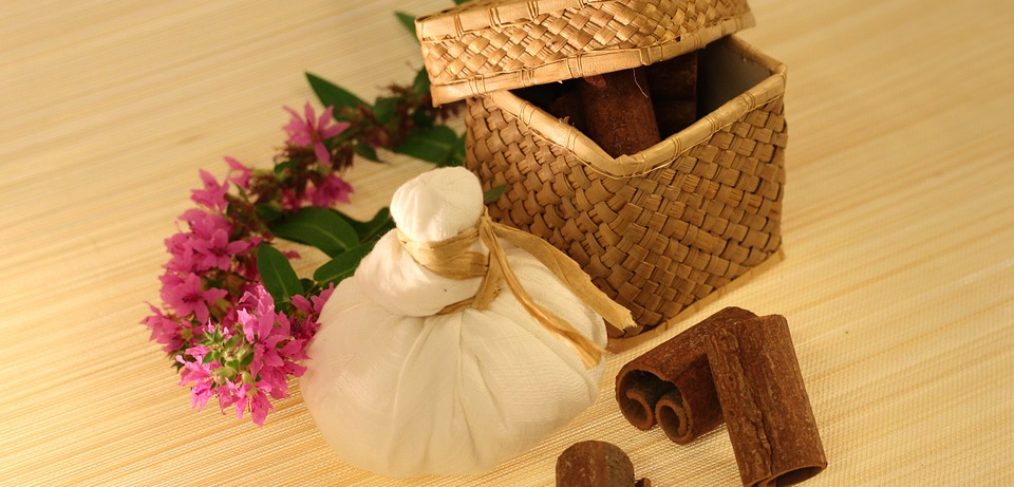The traditional Hindu system of medicine known as Ayurveda has been used for millennia to diagnose, treat, and maintain human health. Meaning “life knowledge” in Sanskrit, it is based on the belief that health and wellness depend on a fine balance between mind, body, and spirit — essentially what we have come to know as the mind-body connection today.
In Western culture, we tend to compartmentalize our aliments, treating mind, body, and spirit as separate and disconnected elements rather than interlinked parts of a whole, connected organism. Ayurveda recognizes that all these systems of the body are interconnected and it is important to keep each one functioning optimally for our best health.
Here are 10 simple Ayurvedic practices that you can incorporate into your daily routine to stay healthy and live a long life.
1. Drink a Full Glass of Warm Lemon Water in the Morning
Popularized in recent years, this practice has its origins in Ayurveda. The benefits from this simple task are many, and your body will definitely thank you for doing it each day. It is a great way to fire up your digestive system in preparation for the day and to flush out unwanted toxins. Lemon water also cleanses the liver and will give you a boost of vitamins and minerals to help start your day on the right foot and boost your immune system.
2. Eat Moderately and Don’t Drink Too Much While Eating
Eat until you are no longer hungry and you feel full, but not like you are about to burst. Try to avoid drinking any liquids half an hour before mealtime and for about an hour and a half after. Drinking too much liquid while eating dilutes stomach acid, making it more difficult to digest your food. If you must drink while eating, try to keep liquids to 250 ml or less, and make sure they are warm, not cold.
3. Allow 4-5 Hours Between Meals
Give your digestive system time to fully digest your last meal before adding more to it. You should also space out the amount of calories you consume throughout the day so your body has adequate energy to function optimally all day long. Digestion is hard work, after all. Try to avoid snacking, if possible.
4. Give Yourself an Abyanga Oil Massage Weekly
It’s safe to say that most people love a good massage!. But why save this special treat for when you have the time to visit a masseuse and can afford to pay them for one? You can give yourself a massage whenever you want and you definitely should, because it is tremendously beneficial to your health and well-being.
The effects of Abyanga are said to be similar to those received when one is saturated with love, so just like the experience of being loved, Abyanga can give a deep feeling of stability and warmth. Abyanga restores the balances of the doshas — your unique blend of physical, emotional, and mental characteristics — and is said to enhance longevity.
Simply massage your body from toe to head with a good oil like coconut oil (or without oil) at least once a week to experience the benefits of this practice.
5. Oil Pulling
Oil pulling is believed to not only help detoxify the body, but whiten teeth and freshen breath as well. There have been several studies that confirmed the effectiveness of this practice for reducing plaque, gingivitis, gum decay and more. From personal experience, I can say it definitely helped to whiten my teeth; I noticed a difference after the first try. Oil pulling involves swishing sesame or coconut oil in your mouth and pulling between teeth for 20 minutes, then spitting out before brushing.
Some reported benefits of oil pulling include: relief from migraines, reduced allergies and inflammation from arthritis, improved sleep, energy, and vision, elimination of eczema or acne, heavy metal detoxification, and healthier gums and teeth.
6. Tongue Scraping
Not only does this practice eliminate foul smelling morning breath, but it can rid the body of some unwanted bacteria as well. In Ayurvedic terms, this practice is a way or removing Ama from your physiology. Ama refers to any accumulation or toxic residue in the mind or body. Tongue scraping can also enhance your taste reception, which can in turn reduce cravings for excess sugar and salt. This practice is also believed to aid the overall digestive process.
Scrape your tongue with a copper tongue scraper daily first thing in the morning to remove unwanted toxins. Do this even before drinking your morning lemon water.
7. Exercise
This one should be obvious by now. We all know that it is important to exercise, but knowing it and actually doing it are two different things! Make it a habit to move daily. This can be as simple as stretching and/or going for a walk every day, or as intense as you’d like to make it. Either way, you’ll feel better physically and psychologically, and chances are, you’ll sleep better, too.
8. Avoid Cold Beverages
Even though nothing is as satisfying as an ice cold glass of water on a hot summer day, you should try to avoid them, especially close to or during meal time. Drinking cold water hinders digestion, it will solidify any fats or oils you have ingested and make them much more difficult to digest. and can actually cause dehydration. Rather than using its energy to digest your food, your body must waste energy trying to regulate the temperature of the water to match it to your internal temperature, which can lead to water loss. Drinking cold water after a meal, on the other hand, can create excess mucus in the body, which can decrease immune function.
It may take a bit of time to get used to, but consider drinking room temperature water and other beverages. I’ve been doing this for a few years now and I can definitely say I prefer it this way!
9. Eat in Peace
When you sit down for meals, focus your full attention on the food in front of you — that means no computer, cell phone, or television to distract you. Simply put, distracted eating leads to overeating. However, sitting down to eat with friends or family, while not always an option, is ideal because it makes you fully present to the experience and generally leads to slower eating. Studies have also shown that people tend to eat more sugary, salty, and fatty foods while sitting in front of the television.
Eat mindfully: chew your food slowly and thoroughly, put down your fork between bites, and really think about the sensation of eating each piece of food. Stop just before you feel full, to allow your brain to catch up to your stomach.
10. Follow a Routine
Follow a daily routine. Incorporate any of the aforementioned practices into something you do every day, and recognize that self-care is an essential part of physical and emotional health. It may be difficult at first to establish these new routines, but once they become habit, you will begin to look forward to these moments in your day.
The more of these you can do the better, but only do what feels right and good for you.
Have you already been practicing any of these daily rituals? How have they benefitted you? Please share in the comments section below.
Much Love



